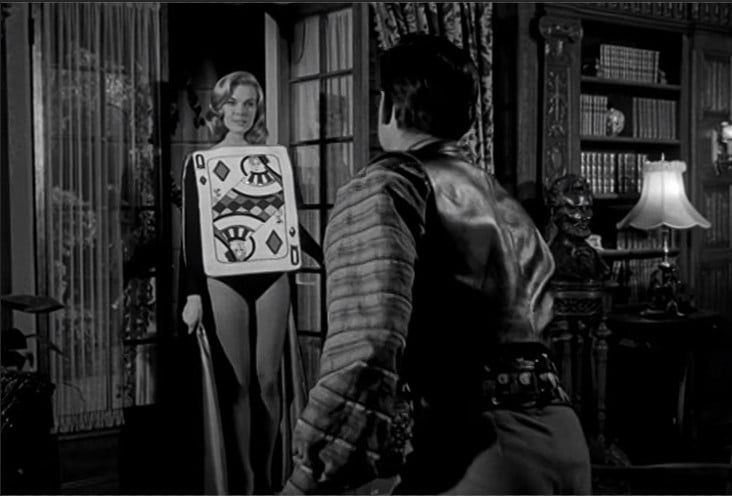Political intrigue, Communism, and an ongoing Cold War are the engaging backdrop contributing to the excellent story in John Frankenheimer’s film, The Manchurian Candidate (1962). The film epitomizes the tense political atmosphere in the United States brought about by the Cold War and, specifically, America’s relationship to the Soviet Union and Communist China.
Despite its firm setting within specific political events and a particular time and place, The Manchurian Candidate illuminates universal and timeless truths about the relationship between freedom and authoritarianism.
Laurence Harvey plays Raymond Shaw, a Korean War veteran. He returns from the war a hero, but darkness is lurking within him. Before his return, Raymond and his company, which includes Bennett “Ben” Marco (Frank Sinatra), were captured by the Chinese and Soviet Communists. They are all brainwashed and hypnotized into forgetting the real events that led to their capture.
But the Communists’ plan is even more nefarious. Raymond has been brainwashed to become an assassin. In fact, under the orders of the Chinese official, he kills two of his fellow soldiers. Raymond’s purpose is slowly revealed throughout the movie—he will assassinate a U.S. presidential candidate so his stepfather, vice presidential candidate and Senator John Iselin, can swoop in and become the VP nominee and later the president in a puppet regime.
Iselin is a doofus politician, a bumbling idiot who is under the power of his wife and Raymond’s mother, Eleanor (Angela Lansbury). He is instructed by Eleanor about his daily habits, as well as political ambitions. But one wonders whether John Iselin has any real ambition at all. He quietly accepts Eleanor’s directives, yet he can also be coarse and angry. Like a petulant child, he oscillates between his fake power and submission.
Ben Marco, who was also under the brainwashing influence, begins to have a recurring nightmare. Every time he wakes up, he wonders what really transpired in Korea. He is troubled by this and brings it up to his superiors. He’s concerned about Raymond, too. When asked what he thinks about him, he replies robotically that Raymond Shaw “is the kindest, bravest, warmest, most wonderful human being I have ever known.” This is a suspicious statement, since Raymond Shaw was hated by most of his fellow soldiers.
Ben is insistent on deconstructing these events. He feels contradictions within himself. In the meantime, Raymond is unaware of his state of being. He mindlessly goes through daily life not realizing his intended destiny. He is certainly not kind to anyone, a trait that has remained with him even through his brainwashing. But he has been transformed into a killing mechanism to be triggered by a seemingly simple and harmless pastime—the game of solitaire. Once he is “encouraged” to play solitaire, and once he finds the queen of diamonds, Raymond is “deployed” to kill. The queen is the trigger.
Of course, Raymond needs to have directives from someone in the United States—an American operator. The sordid and disturbing twist is that the person who is pulling Raymond’s strings is Eleanor Iselin, his own mother. Eleanor supports the Communist cause but more than anything, she is a power-hungry opportunist, living a life of fake patriotism, hunting Communists in America while secretly supporting them, and acting against America’s best interest.
Even prior to this, Raymond endured a strange relationship with his mother, and it’s not difficult to see why. She is cunning, cold, and hardly what would pass for a caring and protective mother. What is even more disturbing is that Frankenheimer hints at something incestuous in the relationship between Raymond and Eleanor. This, and the tragic ending of the film show how the story has all the makings of a Greek tragedy rather than a conventional political thriller.
Raymond is not only experiencing a metaphysical takeover by an ideological entity but is also being manipulated by his mother. This creates an entanglement from which Raymond cannot free himself, except perhaps through death.
These elements of the story all seem to raise the question: Are we ever truly free? Perhaps not, if freedom is understood in the most complete sense. But the film, clearly, takes the position that being free from the manipulation of others is a necessary for human flourishing. The political world, however, is one that is inherently primed for corruption and evil coups of human will, and The Manchurian Candidate does an excellent job of dramatizing Raymond’s agony in relation to this political disorder.
The film also points to the possibilities of enemies within—both within our nation and within ourselves. It is much easier to believe that an enemy of America is something outside of America, and certainly not someone who could be portrayed as a patriot. But more often than not, it is the enemy within the ordered structure who slowly but surely has the power to dismantle the foundations. Even through his dreamlike state, Raymond experiences a disillusionment with America. Things are not what they seem, and The Manchurian Candidate explores the possibility of political unmasking.
In politics, there are always real machinations going on behind closed doors, as our current political condition certainly seems to be working overtime to reveal to us. We are tempted to wonder if behind the pomp and ceremony, behind beautiful speeches—is it all just an illusion? Are we living in a dream, a nightmare, or somewhere in between? Most importantly, what kind of freedom and power does anyone ever truly have?
In our time, the screen that divides the illusion and reality is in the midst of being shattered. The question is what comes next?

Leave a Reply